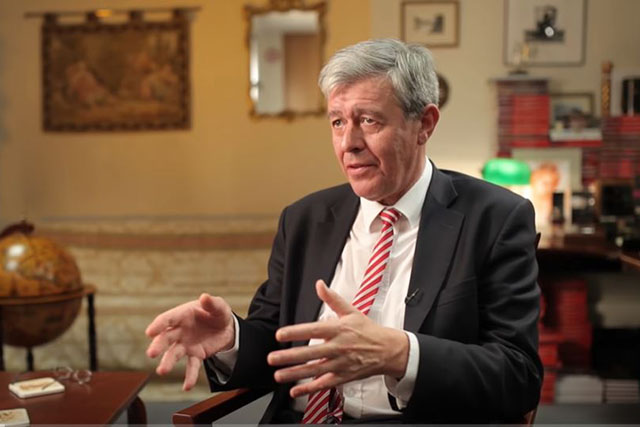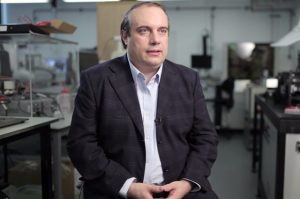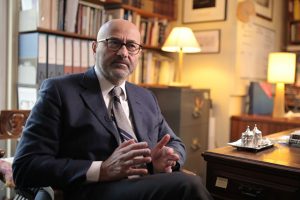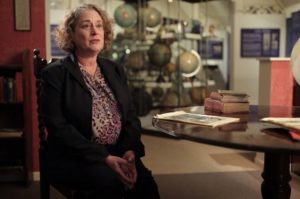Graphene
Nanotechnologist Andrea Ferrari on the properties of Graphene, its significant history, and how to send it fro...

Neuroscientist Karl Friston is Professor at Institute of Neurology, University College London and Scientific Director of Wellcome Trust Centre for Neuroimaging. Prof. Karl Friston is the author of the free energy principle and inventor of statistical parametric mapping, voxel-based morphometry and dynamic causal modelling. Serious Science has asked Prof. Friston about the development of the free energy principle, what remains unknown about the brain and how to become successful in academia.
When did you become interested in science?
I think every child is interested in science; in other words, working out how the world works. One key moment – that I remember as a child – was watching little insects that were crawling around in the sunshine. At first, I thought that they were very clever insects, because they were avoiding the sunlight and hiding from birds. I kept looking at them and suddenly realised that they weren’t very clever: all they were doing was moving faster when they were in the sunlight and slower when they were in the dark. This made it look as if they were being clever and avoiding being exposed to the sunlight – and predation from birds. Like any good scientist, I had found a simple explanation for the way these little insects behaved.
So, from the age of five, I was a baby-scientist – and I think we all are. We are curious creatures. We are all born with a hunger to understand. We spend most of our early lives at school or with our parents trying to understand how the world works. So for me, a scientist is just that – a person trying to understand how the world works.
When did you realise that you were interested in how the brain works?
I was about 15 years old. I wanted to study the physics of the brain because I used to like physics and felt that mathematics was the proper language to articulate how something works. In short, my ambition was to become a mathematical psychologist and I wanted to keep my training in maths alive, whilst becoming a psychologist.
But I made a mistake. In England, you have to decide which exams to take – and which university courses to choose – on the basis of careers advice. I was advised by somebody who didn’t understand that I wanted to be a scientist; namely, a psychologist. They thought I wanted to be a brain doctor; namely, a psychiatrist. So, I spent 8 years becoming a doctor before I got back to research. However, I chose a university that allowed me to do Natural Sciences, so I was able to do both psychology and physics at the start of my medical training.
Do you think that studying medicine was useful for your career?
It was very useful and very rewarding. Medicine is rewarding in the sense that you make a difference in people’s lives – and you can see the benefits of your transactions with patients or other healthcare colleagues. Furthermore, you get to apply your academic skills in a compassionate way.
On the other hand, as a scientist, if you have been a doctor, people take you more seriously when you talk about your theories about how psychiatric syndromes could be caused. In other words, it was also useful because it gave me a gravity, when it came to clinical and translational neuroscience.
So medical background is important to make you look more credible. But do you actually need to have a medical background to be a neuroscientist?
No, not necessarily. I think a medical background would be important if you wanted to ask questions about psychiatric or neurological conditions. You have to understand the pathology both in terms of the physiology and neurochemistry, and the psychopathology. So, you need to understand the structure and nature of the issues before you. This is important for asking the right questions or thinking about the underlying causes of psychiatric syndromes.
But in order to understand how the brain works, you don’t need a medical background. You could be a neuropsychologist. Your agenda would then be to understand how the brain works, where patients are employed as lesion-deficit models. For example, a neuropsychologist would look at the differences between people who were congenitally blind, at birth, versus patients who have subsequently lost their sight, and understand these effects in terms of wiring in the brain or auditory perception.
Was there anyone who influenced your career choice?
My mother and my father both influenced my interests in particular and very distinct ways. My father was an engineer and he was fascinated by physics; so when I was about fifteen, he made me read the Space, Time and Gravitation by Sir Arthur Eddington. And that was when I had my first understanding of relativity and other challenging concepts.
At the same time, my mother was saying “You have to look after people”. She was a nurse and was more interested in psychology, so she was convinced that I would grow up to be a psychologist or a doctor. My current career is a happy balance between these two parental influences.
The funny thing about this story is that a few years ago I discovered that my father had made my mother read the same book on physics before they were married. She pretended to enjoy it but I am not sure that she did.
In your student years, what was your proportion of studying, research and recreation?
In the early days – when you consider yourself privileged to be at a university – you work very hard for two or three years. And then you become bored working too hard. So after a few years, I started doing all sorts of other things. For the latter part of my student life, I didn’t do very much academic work. I actually became more involved in theatre: specifically, directing, set design and stage management. With my friends, we used to take shows to the Edinburgh Fringe. We even performed at the National Youth Theatre in London.
I think the most fun and entertaining performances were revues – or alternative comedy. At that time in England, subversive and risqué comedy were becoming very popular. If you put several comedy sketches together, you’d have a revue. So, most of our time we spent doing these slightly risqué sketches, either in terms of sexual innuendo or political incorrectness. However, my favourite performances were old-fashioned operettas by Gilbert and Sullivan.
Once we even won the Students on Stage Award. This was our brief moment of fame, when one of our performances got into Cosmopolitan magazine.
What are your favourite books?
One of my favourite books is my first scientific book; Space, Time and Gravitation by Sir Arthur Eddington. And the rest are books like The Lord of the Rings by Tolkien. So it’s escapism and fantasy, which is very relaxing. In other words, I like books about physics and mathematics or complete escapism and stories like the ones by C.S. Lewis.
And then, of course, there was War and Peace. I still have the original copies that I had when I was fifteen – and look at them nostalgically in my bookcase. However, I don’t have time to read them now. I don’t have time to read for pleasure anymore. Every day someone asks me to review a paper or a proposal or write a blurb for a book. I now only read scientific material, even on the summer holidays.
How do you balance your research and your family?
Very badly. I’m still happily married! But the balance is very bad – it’s all work – seven days a week. But it’s not necessarily something one should expect if one wanted to pursue an academic career. I think there are people who are better at engineering their work-life balance than I am. The only reason I can indulge in the work is that my family are very supportive – and also they are academics. My wife is a nurse and she spends a lot of time with her patients. So we are all quite selfish in our altruistic careers.
The work that I do is almost like fun for me. I don’t actually see patients now, I just teach students and I do purely theoretical research. So, if I make a mistake, no-one dies and no-one suffers. My life is quite relaxed and I enjoy my work as if it was a part of my recreation or social life. Talking to my students is like socialising, so I don’t feel like I am really missing out on that balance.
When you get older you are in charge of your own time. I don’t usually speak to anybody until lunchtime, so I can sit and think at home, doing e-mails or smoking my pipe. This means I shift my day by an hour or so – and travel into London after the rush hour. I can have the train to myself and read papers – and then I go home very late. My life is quiet and pleasant and I don’t feel too much pressure. I think people are starting to work like that more and more: the internet gives you the latitude to take charge of your daily routine.
What, in your opinion, makes a good scientist?
Curiosity, obviously, rigour, slightly obsessional perfectionism, being able to identify important questions. To be a good scientist you have to indulge in a degree of lateral or creative thinking, in terms of constructing new questions. I normally say that a mark of a good scientist is the quality of questions they ask. So that would be the hallmark of a good scientist for me: asking questions that no-one has asked before.
Academia is a very stressful and demanding field, many people give up during their PhD. Did you ever have the temptation to leave academia?
No. That’s interesting, I haven’t found academia that difficult. I think I avoided these stresses because I was very lucky. I was lucky to enter research at the beginning of brain mapping, when was a need for people who could do maths and understand brain function in terms of developing new methods. Although I was lucky, I think there are all sorts of opportunities like brain mapping. Everybody can be ‘lucky’ if they can find the emerging new ‘thing’ when choosing their PhD.
The people I see – who leave academia around their PhD – usually choose to do this because they want to apply their academic skills in the industry, in marketing, in journalism or in education. So they’ve made a choice: “I’ve now skilled myself in an academic sort of way, and now I want to apply these skills in a different context”. And usually, they make more money! So I wouldn’t regard these career trajectories as failing to be an academic. Generally, the people I know who have left academia are richer and possibly happier.
When asked to advise PhD students, I say the important thing is to have a broad base – so you have choices later in life. You can choose to be a professor, or you can choose to go into marketing or journalism. And you have that choice because you’ve invested in a broad academic training when you were younger. Clearly there are too many PhD students and not enough professorships for everybody to become a professor, so everyone has to find their own way forward.
And how do you invest in your broad academic training?
Just entertain as many different subjects as you can, keep your education going as long as you can, beyond your PhD, so that you always have choices. It’s important to expose yourself to a broad range of subjects – so that you don’t narrow down your choices later in life. For me, this breadth involved doing brain sciences, psychiatry, biology and physics. I can rely on these things and combine them as a biomathematician or computational neuroscientist.
How did you come to the idea of the free energy principle?
Well, the underlying idea had been nascent since my early childhood. I spent a lot of time formalising the idea, writing it down and making it mathematically explicit. It actually goes back to those little insects moving around in the sunshine.
Then, I came back to London and met Geoffrey Hinton – who is a grandfather of machine learning. He was next door to our new brain imaging unit. I learned a lot about the mathematics of optimisation, from reading his papers and listening to his lectures. The sort of optimisation found in neuroscience, evolution and machine learning all came together in terms of minimising variational free energy. Variational free energy had been established as a statistical tool for many decades but seemed to me to have a broader explanatory power, not just for statistics but also for our behaviour and the self-organisation of any sentient system. And that’s really how it started.
I needed to learn enough physics, machine learning and philosophy to be able to describe mathematically how that might work. And then, importantly, to show that it can work using simulations in computers. This is because it’s not sufficient to say: “Oh, it’s a good idea and this is how the world works”. You have to be able to simulate synthetic creatures that minimise free energy – and show that they do things that we humans do.
Living systems act in the world in order to minimize surprise, but anxiety disorder patients don’t seem to minimize uncertainty. How can this be explained with the free energy principle?
The thing that makes it unpleasant – the anxiety – is exactly the uncertainty that is minimised under free energy principle. On this view, anxiety is uncertainty about which particular strategy to choose, in terms of active engagement with the world. We, as free energy minimizing creatures, tend to minimize our surprise: we turn the light on to see what’s around us in the darkroom, we pursue well-worn paths. In other words, we try to make the world predictable and minimize the surprize we expect, so everything we do is in the service of minimizing uncertainty. The most unpleasant way that this could fail is not being able to choose the things that would resolve uncertainty, and that is anxiety.
When you can’t commit to an uncertainty-reducing course of action have a high entropy or very uncertain distribution over your policies. You know you are going to have to do something, but you don’t know what, and that leads to physical arousal. Then your body senses these signals of physical arousal, and the best explanation – that makes these signals maths surprising – is that “I’m stressed”. Recognizing yourself as being stressed reduces your surprise and minimizes free energy. So it’s a vicious cycle – and if you get caught in it for prolonged periods, it could lead to chronic stress or an anxiety disorder.
How do you break the cycle?
You break your circular inferences through cognitive behavioural therapy. When people have panic attacks, you explain to them that the reason they feel like they’re having a panic attack is because they’ve been over-breathing, and that the pH of their blood causes certain ions to move away from the receptors in the nerve cells so that they have abnormal sensations. These are just consequences of breathing too much, it’s not a symptom that you are going to explode and die. This gives people a new hypothesis for the model that they can use to explain their sensations – and to reduce their surprise about these signals. Now they can predict these symptoms with their new model and thus break the circle. Alternatively, you can use drugs, but they may cause addiction.
Interestingly, one can simulate this kind of interoceptive inference – and create little anxious computers that don’t know what to do. In other words, you can create a synthetic environment and a little free energy minimizing agent, that finds it very difficult to identify one policy or another. Then you can create a generative model that includes beliefs about the agent’s own heart to simulate physiological arousal.
How do you do that?
Well, you just model a synthetic heart. When things occur and the agent cannot explain them, its heart starts beating faster and this has implications for the way the agent gathers visual information. So you get circular causality in terms of trying to reduce uncertainty by foraging in the world, while at the same time predicting how your physiology is affecting the way you are foraging in the world. All of that together conspires to produce a rather anxious little animal that, typically, won’t do anything.
There is a paper by Micah Allen in Denmark who has described a little artificial animal, a mouse that has active inference and can get anxious and upset. You give it some food or safety, or you can threaten it with a cat. In short, you can make the little silicon mouse happy or you can make it very anxious.
What do you think is still to be understood about the human brain?
It’s important to ask the right questions in order to reduce our uncertainty, to minimize our free energy. We can see that at many different levels: from viruses to vicars. And an interesting question is how do we actually generate the questions to ask? Where do these questions come from? That’s very important and outstanding.
Another issue, of course, is consciousness, the sense of self. Why is it that we think we are a person? Is ‘selfhood’ a surprise minimizing hypothesis that provides a nice explanation for all the sensations that we have. And what does that mean for self-awareness? Is self-awareness necessary for me to realize that I am different from you – and is it necessary to even realize that I am a person? All of these philosophical issues of consciousness and self-awareness her yet to be resolved. And it will be most interesting to resolve them in artificial intelligence.
People are now getting bored with machine learning that just plays chess. They want machine learning that knows why it’s playing chess and machine learning that enjoys winning. So the third wave of AI is going to be about artificial general intelligence (AGI) and this sort of intelligent artefact is going to be much more like you and me. AGI will do the data foraging itself, it will want to know more about you. So, it will ask you questions to know certain things about you. And we come back to the problem about how to ask questions. So when your computers start asking meaningful questions, that’s when we have a cause to be frightened – or delighted.
Edited by Karina Akopyan

Nanotechnologist Andrea Ferrari on the properties of Graphene, its significant history, and how to send it fro...

Historian Alessandro Scafi on the garden of Eden, Augustin's concept of creation, and the emergence of the ter...

Historian and Philosopher of Science Liba Taub on Aristotle, the cattle problem, and art as a means of science...